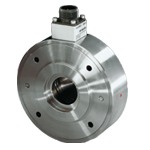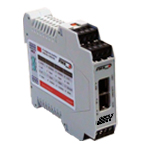Web tension control in plants with large material-dependent web tension differences.
In recent years, the increasing demands of the paper and film converting industry with regard to the material diversity of their end products have strongly influenced the development of the required production systems, as each material to be processed brings its own specific properties into play. The machine and control technology must be designed accordingly. Not only drive capacities, but also the mechanical designs must be adapted to the materials and the forces that occur during processing. In order to keep these forces constant depending on the material and the process, web tension measurement or control is an important topic with constantly increasing significance. Here, the highest demands are placed on the recording of the actual web tension and the fastest and most reliable signal evaluation possible.
The principle
For almost 30 years, FMS Force Measuring Systems AG in Switzerland, has been producing the original LMGZ force measuring bearings, which are used worldwide. With the numerous sizes and nominal forces from 33 to 25000 N offered in this design alone, FMS met the demand of machine builders very early on and replaced the function of dancer rollers with force measuring bearings. This allowed processing operations to be optimized and machine speeds to be increased.
FMS has continually led it development program based on real world needs, the flexibility gained in the process and the close cooperation with machine builders and end users in the paper, film, textile and metal strip industries contributed to the development of new innovative products. FMS provided the answer to the demand for a force transducer with a very wide spread of the measuring range with the LMGZD series, a double measuring range bearing for evaluation via two separate channels. Taking into account the influences occurring in the field, the signal evaluation of the normal force transducers is carried out in the ratio 1/20 as a rule of thumb for common applications. This means that with a measured web tension of 5 percent of the nominal force of the force transducer used, an analog measuring amplifier such as the EMGZ310.ComACT, for example, provides an output signal of 0-10V. However, if a processor has to cope with extremely different materials on his machine in rapid succession, a much higher range than 1/20 is required.
This is where the LMGZD comes in. Due to the mechanical division into two measuring ranges, which are customized to the applications, the web tension to be measured can be evaluated as a rule of thumb in the ratio 1/100. The basic difference to normal force measuring bearings is the use of two measuring webs with different nominal measuring forces, which are arranged in such a way that they provide measuring signals simultaneously. For small forces, the lower measuring range provides good signals, which can no longer be determined accurately with a transducer for large forces. If large forces are to be measured, the system switches to the high measuring range. The integrated mechanical overload protection reliably protects the measuring webs of both the small and the large measuring range against overload.
The construction is designed in such a way that even the low nominal measuring range can withstand the overload of the high nominal measuring force range. In addition, safety is further increased by a slight overlap of the nominal measuring force ranges. Since the two measuring ranges function independently of each other, signal evaluation is performed via a coupled EMGZ310.ComACT amplifier, which offers a Bluetooth connection and a special Android or iOS app for operation and configuration. On the connected smart device, short recordings of the measurement data can also be easily logged and evaluated, for example, via a program with spreadsheet. This function is especially helpful for service and analysis purposes.
The benefit
The major advantage for the machine builder and end user is reflected in the compact design of the force sensor and the very large resolution range of the entire measuring system. By using FMS technology, cost-saving can be realised, systems with web tension control can be expanded for universal and high-quality material processing and easily integrated whether you’re an OEM or end user.
LMGZD in operation



